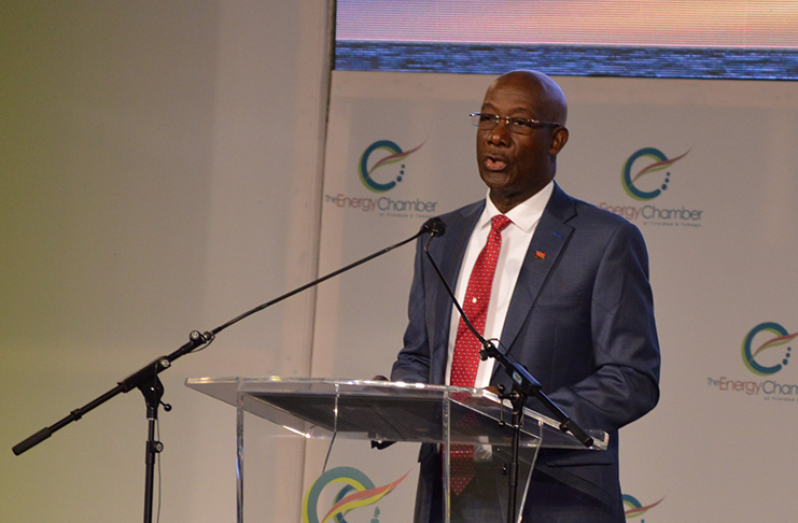DUE to Guyana’s many successes in the oil and gas sector, the Caribbean Region is generating greater attention from a number of upstream companies.
Hoping to benefit from this, Trinidad and Tobago is seeking to extend its maritime jurisdiction in close proximity to the Guyana-Suriname Basin. These were the sentiments shared by Trinidad and Tobago’s Prime Minister, Dr. Keith Rowley, at the Energy Chamber of Trinidad and Tobago Energy Conference and Trade Show 2020 on Monday.
The country’s leader said that, spurred on by Guyana’s success, there is now exploration activity along the length and breadth of the Caribbean with the most recent success seen off the coast of Suriname. He told the audience at the Hyatt Hotel: “Exploration successes for oil and gas particularly in Guyana have radically changed the perception of the Region. The Region, with justification, is now being heralded as the next major oil and gas province. This has generated unprecedented interest by upstream companies. Guyana has been the main recipient of investment in exploration and development by these companies.”
Announcing its 16th oil find on January 27, 2020, U.S oil giant, ExxonMobil, increased its resource estimate for the Stabroek Block to over eight billion oil-equivalent barrels. Meanwhile, Dr. Rowley pointed out that the US Geological Survey ranks the Guyana-Suriname Basin as second in the world for prospectively among the world’s unexplored basins and twelfth for oil among all the world’s basins – explored and unexplored.
He stated that other Caribbean countries, such as Barbados, are seeking to capitalise on the interest shown by the investing energy companies. Barbados granted licences to the Australian multinational conglomerate, BHP, to explore off its South-East Coast and to Repsol to explore to the Northwest of the island. The Prime Minster also pointed out that Tullow and its partners continue to prospect on a “huge block” to the South of Jamaica on the Pedro Banks, while the Bahamas Petroleum Company (BPC) is conducting exploration to the South-West of Andros Island.
Reports indicate that Global Petroleum Group has found some gas close to Grenada’s maritime border with Venezuela. With regards Trinidad and Tobago, Dr. Rowley said that once maritime matters are settled with the United Nations Convention on the Law of the Sea, the country hopes to benefit from the successes of the Region.
“Trinidad and Tobago is poised to participate in the exploitation of hydrocarbon in the marine areas off the Guyanas. Our claim to the United Nations Commission on the Limits of the Continental Shelf is expected to be presented this year and if successful, would extend our maritime jurisdiction seawards to areas in close proximity to the Guyana-Suriname Basin,” Rowley stated.
The country, which has a long history in the industry, has also pledged to assist the new entrants such as Guyana, Grenada, Barbados, Jamaica and the Bahamas with the development of their petroleum sectors. The Prime Minster noted the Memoranda of Co-operation signed with Guyana, Grenada and Barbados for provision of technical assistance as well as preliminary discussions on the development of unitisation agreements with Grenada and Barbados.
“Trinidad and Tobago, by virtue of its location, has an opportunity to provide logistical and offshore support to operators in the emerging Caribbean Oil and Gas economies. This will require the expansion of our marine infrastructure on our South East Coast,” Rowley stated. “Active consideration is being given to the expansion of the Galeota Port to meet the demand for services that will be generated by exploration in new marine blocks on the South East and East Coasts of Trinidad and Tobago and in offshore oil and gas developments in the Guyanas and other Caribbean countries.”
Although Trinidad and Tobago is a well-recognised exporter of Liquefied Natural Gas (LNG), the island has experienced a decline in natural gas production since 2014, even as its energy sector accounts for around 34.9 per cent of the country’s Gross Domestic Product (GDP).
According to their Ministry of Energy and Energy Industries, for over 100 years the country has undertaken considerable oil and gas exploration activity on land and in shallow water with cumulative production totalling over three billion barrels of oil. Meanwhile, Guyana’s estimates in just the Stabroek Block, thus far, have been pegged at over eight billion barrels of oil with discoveries in other oil blocks as well.





.jpg)








